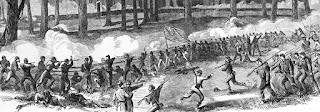MAY, 1863 BATTLE OF RAYMOND, MISSISSIPPI, IN PAGES OF FIGHTS HISTORY
BATTLE OF RAYMOND was the well know battle in the pages of history the several aspects this battle also written in pages of history that consist of: Union General McClernand's Corp, out of the lead of the Union
Army surprisingly since leaving Milliken's Bend, Louisiana in mid-April,
achieves Five Mile Creek in Mississippi. In the interim, General Sherman
achieves Auburn, Mississippi. But since the streets out of Raymond have not
been picketed, explorers from that point can travel every which way however
they see fit. In this way McPherson, progressing out of Utica, is very much
aware of the nearness of Confederate troops in Raymond, yet the Confederates
are not yet mindful of his nearness, simply a large portion of a day's walk
South of Raymond. Not having any desire to caution the Confederates, the
Federals are walking under strict drum and cornet quiet. Still, General
McPherson's greatest concern this day is discovering water for his men. It is
an astonishing unforeseen development considering that for a considerable
length of time his men have been midsection somewhere down in bogs and inlets.
It has been the driest Mississippi spring in decades.
Truth be told it is a year for outlandish climate. On January
21, 1863 the Army of the Potomac endured the scandalous "Mud March".
Days of overwhelming precipitation, trailed by awful winds and temperatures in
the 30's, turned yet another endeavor to evade Lee's Army of Northern Virginia,
into a solidifying walk into damnation. Crushed by the climate the Union troops
come back to their winter camps and the blundering General Ambrose Burnside was
supplanted by the careless Hooker. After a month, on February 25, a foot of
snow and gentle temperatures permit 10,000 revolt troopers of the Army of
Northern Virginia to take part in what may have been the biggest snowball
battle ever.
Early that spring agriculturists in the upper Midwest
detected a decent yield ahead, however May conveyed dry season from Minnesota
to the Gulf of Mexico. St. Paul recorded not as much as an inch of rain over
the initial 21 days of May, and after that on the 22 \23 the city was
overwhelmed with a 2 inch storm – trailed by an arrival to dry spell conditions
and cool temperatures. The Mississippi River is low to the point that flatboat
and pontoon movement through the twin urban communities is vigorously limited.
The dry spells in Southern California that year and the
following were so extreme they slaughtered a fourth of a million steers in
Santa Barbara County, and much more in Los Angeles and San Diego provinces,
decreasing the greater part of the Southern California Rancheros, the
establishment of the neighborhood economy, to money related destroy. It
additionally opens the path for the presentation of the Valencia Oranges from
South America. The record of tree rings says that the dry season of 1863-64 over
the Great Plains and the South Western United States was considerably more
extreme than the Dust Bowl years of the 1930's.
Confederate General Johnston transmits Pemberton in
Vicksburg, asking him to surrender the city and pull back to Jackson. Pemberton
can't. Jefferson Davis has requested him to hold Vicksburg no matter what.
Pemberton answers rather to Johnston that he has set solid strengths along the
Big Black River and is endeavoring to manufacture a constrain "of
move" at Raymond. Pemberton's "arrangement" is basic; whichever
way Grant turns there will then be a Confederate armed force in his back. It is
a splendid "Napoleonic" arrangement on paper and absolutely illogical
in all actuality. It relies on quick correspondence between two broadly isolated
strengths, partitioned by an intense and dynamic foe compel. Johnston realizes
that when the strengths at Raymond could intercede, Grant could annihilation
Pemberton's armed force on the Big Black. What's more, Grant is going to
demonstrate the foolishness of Pemberton's arrangement, ought to the Union
troops rather fall on Jackson. Plus, whichever way Grant turns, Pemberton's
procedure has left the Vicksburg and Jackson Railroad unprotected. With to such
an extent as a burn mile of that track demolished, Vicksburg turns into an
obstacle. Be that as it may, Pemberton appears to be unwilling to acknowledge
this reality.
General Gregg's troops touch base in Raymond late toward the
evening, clean secured and depleted once more. One fighter composes, "…
when the unit documented into a field close Raymond to camp, the men were
excessively drained, making it impossible to remain in line sufficiently long
to 'right dress,' and everybody dropped to rest when we stopped."
shockingly Gregg does not discover Wirt Adam's rangers around the local area as
he had been told they would be, (Adams has dashed ahead to Edwards), abandoning
on protect just a drive of 40 state mounted force volunteer army. Gregg is
compelled to awaken his own particular men to at last picket the Utica street.
General Johnston sends yet another, firmer, cautioning to
Pemberton. He tells the authority at Vicksburg that Grant is pushing toward
Jackson and begs Pemberton to assault the Union back. Pemberton answers that he
is as yet not certain which way Grant will turn.
General Gregg in Raymond gets word that the principle Federal
constrain is moving toward Edwards, Mississippi. Be that as it may, he
additionally knows, at last, that there are Federal troops moving toward his
own position. He sensibly expect this last gathering must be an insignificant
striking gathering. Soon after day break he parades his men through town and
covers them in fields at the edge of Fourteen Mile river, with 35 men picketed
on the extension over the rivulet itself. At the point when the Federal
striking gathering charges over the extension Gregg means to stick them against
the stream with an irate and overpowering charge of his own.
Similarly as Gregg expects, around 10AM, Federal skirmishers
show up at the tree line South of Fourteen mile brook. Be that as it may,
incredibly they are upheld by Union big guns, which starts to shell his picket
watch with canister. Obviously this is more than a negligible assaulting party.
In any case, Gregg now expect it is simply a detachment. So he moves his 3,000
men out of canister range behind some low slopes, where they can stay shrouded,
prepared to fall upon the Union Brigade after it crosses the scaffold. Gregg
additionally moves two regiments into woods to one side where they can rapidly
slip over the river and catch the Union cannons.
What Gregg does not know it that he is confronting General
John Alexander "Dark Jack" Logan's whole Third Division, propel watch
for McPherson's seventeenth. Corps of 16,000 men. Logan may resemble a wild man
with his exceptional pure black eyes and tosseled hair yet he is a shockingly
decent trooper - regardless of the possibility that he is yet another of those
Stephen Douglas Democratic commanders. In any case, the distinction between the
political officers Logan and McClernand, is that Logan is an appeal ling pioneer
of men without any fantasies of higher charge. What's more, he notices Gregg's
trap to his front. Logan enables his men to take a dinner break while he posts
mounted force on his flanks.
It is evening before Logan arranges his men to progress. In
any case, what takes after would be a parody of mistakes if men were not
dieing. On the Union right the 23rd Indiana regiment crosses Fourteen Mile
Creek over the extension, and staggers sideways into a Texas Regiment that
rebuffs the Hoosiers and sends their survivors hurrying into withdraw back the
way they came. At that point the Texans charge over the stream and are gotten
in a cross fire between an Ohio and an Illinois regiments. They likewise fall
back in withdraw. On the inverse flank, the two Confederate regiments venture
out of camouflage to find what resembles the whole Federal Army in line of
fight before them, with another two full Union Regiments defeating the revolt
position at that exact second. In a glimmer the tables have been turned, and
all of a sudden the Confederates had been suckered into assaulting a far
unrivaled drive. The best that Gregg can now do is to battle a progression of
frantic deferring activities while he pulls back, secured by the Third Kentucky
Mounted Infantry which has quite recently touched base from Jackson. Raymond is
relinquished as Gregg falls back on the Mississippi capital.
The Union losses at this "Skirmish of Raymond" are
68 murdered, 341 injured, and 37 missing. Revolt misfortunes are accounted for
as 100 murdered, 305 injured, and 415 caught. In any case, the Union Army
reports covering numerous more Rebel dead than the 100 formally recorded,
demonstrating the erratic way of the compel that was rapidly put together at
Raymond. McPherson detects this and informs Grant.
By messenger and transmit Grant tells Washington of his goal
to assault the state capital of Jackson, Mississippi on the fourteenth. The
pace of occasions around Vicksburg are all of a sudden grabbing.
Requested by Lt. Gen. John C. Pemberton, Confederate officer
at Vicksburg, Brig. Gen. John Gregg drove his constrain from Port Hudson,
Louisiana, to Jackson, Mississippi, and out to Raymond to capture moving toward
Union troops. Before day break on May 12, Maj. Gen. James B. McPherson had his
XVII Army Corps on the walk, and by 10:00 am they were around three miles from
Raymond. Gregg chosen to question the intersection of Fourteen Mile Creek and
exhibited his men and mounted guns as needs be. As the Yankees drew nearer, the
Rebels opened fire, at first creating overwhelming setbacks. Some Union troops
broke, however Maj. Gen. John A. Logan mobilized a drive to hold the line. Confederate
troops assaulted the line yet needed to resign. More Yankees arrived and the
Union drive counterattacked. Substantial battling resulted that proceeded for
six hours, however the mind-boggling Union constrain won. Gregg's men left the
field. In spite of the fact that Gregg's men lost the fight, they had held up a
much unrivaled Union drive for a day.






Comments
Post a Comment